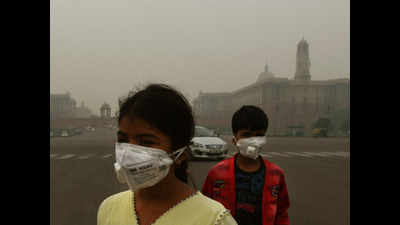- News
- City News
- delhi News
- Delhi: Air quality in ‘severe’ zone again, unlikely to improve till tomorrow
Trending
This story is from December 29, 2019
Delhi: Air quality in ‘severe’ zone again, unlikely to improve till tomorrow
The air quality in the city declined sharply and turned “severe” on Saturday with the air quality index (AQI) crossing 400-mark. It clocked 409. On Friday, the national capital had recorded “very poor” AQI of 373. The last time the air quality had deteriorated to severe category was on December 21, when the AQI was at 418.

The capital had more clean air days in 2019 compared with each of the past three years (File photo)
NEW DELHI: The air quality in the city declined sharply and turned “severe” on Saturday with the air quality index (AQI) crossing 400-mark. It clocked 409. On Friday, the national capital had recorded “very poor” AQI of 373. The last time the air quality had deteriorated to severe category was on December 21, when the AQI was at 418.
Track the pollution level in your city
An AQI from 0-50 is considered ‘good’, 51-100 ‘satisfactory’, 101-200 ‘moderate’, 201- 300 ‘poor’, 301 -400 ‘very poor’ and between 401 and 500 , it is classified as ‘severe’ on the Central Pollution Control Board (CPCB)’s index.

According to SAFAR, low mixing layer and lack of surface winds have resulted in this toxic air quality, which will continue till Monday. “A fresh western disturbance is very likely to affect the region by December 31 and improve surface winds speed and ventilation. Improvement in AQI towards higher end of the very poor category is expected. And further improvement to the middle of the very poor category is expected by January 1, 2020.”
The capital had more clean air days in 2019 compared with each of the past three years. But it also saw a spike in the number of severely polluted days, an analysis of the Central Pollution Control Board’s data of PM2.5 concentrations in the air reveals, TOI had reported on Friday.
The analysis, conducted by the NGO—Centre for Science and Environment (CSE), for data till November 30, shows that the number of “good”, “satisfactory” and “moderate” days had sharply increased since 2016, pointing to a general lowering of pollution levels.
However, Delhi also recorded a higher number of “severe plus” days this year compared with the last year, indicating that the period of peak pollution during the stubble-burning and Diwali season (late October and November) continues to pose a major threat to the region’s air quality.
The air quality index had touched a peak of 494 in November, the highest since it touched 497 in November 2016. In comparison, the highest AQI recorded in 2018 was 450 in December.
Track the pollution level in your city
An AQI from 0-50 is considered ‘good’, 51-100 ‘satisfactory’, 101-200 ‘moderate’, 201- 300 ‘poor’, 301 -400 ‘very poor’ and between 401 and 500 , it is classified as ‘severe’ on the Central Pollution Control Board (CPCB)’s index.

Data according to the CPCB’s central control room showed Delhi NCR’s average PM2.5 levels recorded at 235.5 micrograms per cubic metre at 8pm on Saturday. The average PM10 levels (373.3 micrograms per cubic metre) were also more than three times the safe standards. The safe standards for these pollutants under GRAP are 60 and 100 micrograms per cubic metre, respectively.
According to SAFAR, low mixing layer and lack of surface winds have resulted in this toxic air quality, which will continue till Monday. “A fresh western disturbance is very likely to affect the region by December 31 and improve surface winds speed and ventilation. Improvement in AQI towards higher end of the very poor category is expected. And further improvement to the middle of the very poor category is expected by January 1, 2020.”
The capital had more clean air days in 2019 compared with each of the past three years. But it also saw a spike in the number of severely polluted days, an analysis of the Central Pollution Control Board’s data of PM2.5 concentrations in the air reveals, TOI had reported on Friday.
The analysis, conducted by the NGO—Centre for Science and Environment (CSE), for data till November 30, shows that the number of “good”, “satisfactory” and “moderate” days had sharply increased since 2016, pointing to a general lowering of pollution levels.
However, Delhi also recorded a higher number of “severe plus” days this year compared with the last year, indicating that the period of peak pollution during the stubble-burning and Diwali season (late October and November) continues to pose a major threat to the region’s air quality.
The air quality index had touched a peak of 494 in November, the highest since it touched 497 in November 2016. In comparison, the highest AQI recorded in 2018 was 450 in December.
End of Article
FOLLOW US ON SOCIAL MEDIA










